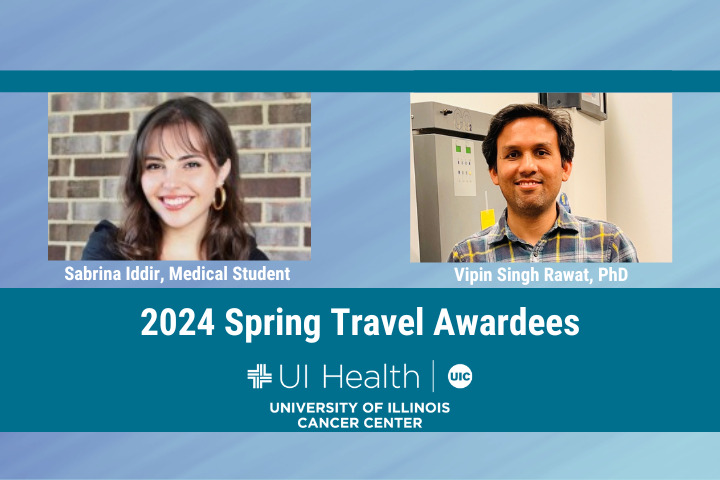
Medical Student Sabrina Iddir and Postdoctoral Fellow Vipin Singh Rawat, PhD, are recipients of the University of Illinois Cancer Center 2024 Spring Trainee Travel Awards.
Each will receive $500 to offset the cost of travel and registration to present their cancer-related work at conferences, which are valuable opportunities for young scientists to share their work, as well as chances to network with other scientists.
Iddir, a third-year University of Illinois College of Medicine student, will present her abstract, “Predicting Malignant Transformation of Choroidal Nevi Using Machine Learning,” at the Association for Research in Vision and Ophthalmology (ARVO) Annual Meeting in Seattle, Washington, in May.
Mentored by Cancer Center member Michael Heiferman, MD, part of the Cancer Center’s Translational Oncology Research Program, Iddir’s research focuses on artificial intelligence in ocular oncology and retinal pathologies. The primary goal is to enhance the diagnostic process of ocular tumors, optimizing patient prognosis and preventive care. They are building a robust dataset of multimodal imaging of ocular lesions and using machine learning techniques to improve diagnostic accuracy and efficiency, and potentially uncover novel tumor detection methods.
Rawat, a College of Medicine Department of Physiology and Biophysics Fellow, will present his abstract, “Therapeutic Enzyme Depletion of L-Serine for the Treatment of Serine Auxotrophic Tumors,” at the American Association for Cancer Research (AACR) Annual Meeting in San Diego, California, in April.
Mentored by Cancer Center member Jonathan Coloff, PhD, co-leader of the Cancer Center’s Cancer Biology Research Program, Rawat is interested in discovering novel metabolic vulnerability in cancer cells with an ultimate goal of targeting metabolism for cancer therapy. Coloff’s lab recently discovered that ER+ breast cancer cells are serine auxotrophic due to silencing of PSAT1 gene. As a result, they are highly sensitive to dietary serine deprivation. Although dietary serine deprivation proves to be effective in reducing tumor growth in mice, several limitations still exist. Therefore, they recently re-engineered human SDH enzyme for therapeutic serine degradation in vivo. Coloff’s lab believes this enzyme could be a better therapeutic strategy compared to dietary serine restriction and will also help to improve the therapeutic response when combined with pre-existing therapies.
Trainee Travel Award Details
The Cancer Center annually funds two rounds of Travel Awards in the Spring and Fall. Students, postdoctoral fellows, and clinical residents/fellows engaged in cancer-related research and mentored by faculty at the University of Illinois Chicago are eligible. To be considered, Travel Award applicants should complete the Cancer Center Trainee Membership form if they not done so in the past, and the must have proof of submission of an abstract for an oral or poster presentation at a conference or scientific meeting.
